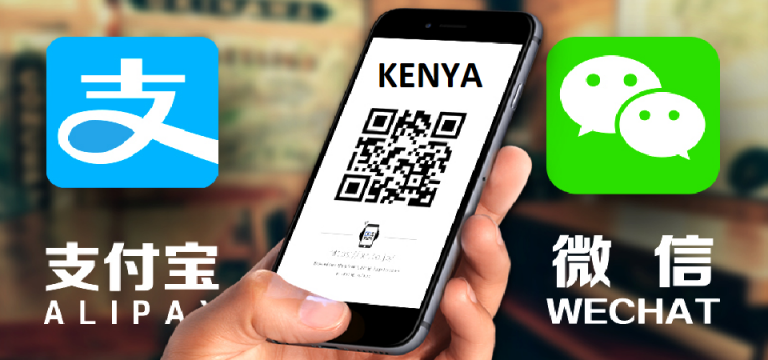
China funds a project. Many Chinese come to town. They have tons of money to spend. Then local companies begin to look for payment systems which can support them. From New York City where AliPay has been implemented (to support Chinese tourists) to Kenya, there are many elements to the New Silk Road. In Kenya, the Chinese expatriates like Alipay and WeChat, and to meet their needs, Kenya needs to have those two solutions which continue to track wherever Chinese go. In a partnership between Equitel and Red Dot Payments, Alipay and WeChat would be available in Kenya.
According to Finserve’s Managing Director, Jack Ngare, the partnership will see Kenyan businesses benefit from having one more option of accepting payment, which is meant to encourage an increase in international trade. “The key purpose of Equity is to empower businesses. We still believe there’s a lot of room for more payment options to come into this market,” he said.
Alipay founder, Jack Ma, was in Kenya a few months back and hinted at Alipay looking for a partner to do business within the country, we are not sure if this is the result of that hint but the inclusion of WeChat Pay could be pointing us to a different direction.
Once the service goes live, anyone with an Alipay or WeChat Pay account will be able to make seamless payments to Kenyan businesses that will have signed up for the service, through their respective platforms. The long-term plan, according to Equitel, is to allow Kenyans to be able to hold Alipay and WeChat Pay accounts through them and thus facilitate international payments.
MPESA Challenge
This is certainly not good news for MPESA. I do predict that MPESA will lose market share because MPESA is a mobile money solution while WeChat is a living ecosystem with capabilities to do anything you can do online, from shopping to gaming. Yes, MPESA is a payment system; WeChat is an internet operating system (WhatsApp, Facebook, Twitter, and Instagram, all in one).
That feature is why the more the users the better, and that means the best in technology will re-grow even when broken apart provided it has enough users to seed that moment. Over time, there will be convergence. WeChat is the Internet first operating system which practically does everything: WhatsApp, Facebook, Twitter, Instagram, all in one. It is a seed that will keep growing, and breaking it will have minimal impacts, unless you want another name, not WeChat, to do the same thing tomorrow in China.
All Together
The Kenyan banking regulator has run a regulatory regime where market forces are allowed to play. Allowing WeChat and Alipay in Kenya would certainly have real challenges to the Kenyan banking system. Even in China, WeChat has become so popular that local banks are having liquidity problems as what users do is to move their monies from their bank accounts into WeChat, and from there spend as they want. The banks have become pipelines into and out of WeChat and nothing more.
Register for Tekedia Mini-MBA edition 19 (Feb 9 – May 2, 2026): big discounts for early bird.
Tekedia AI in Business Masterclass opens registrations.
Join Tekedia Capital Syndicate and co-invest in great global startups.
Register for Tekedia AI Lab: From Technical Design to Deployment (next edition begins Jan 24 2026).
For the banks, this is a very huge test because if WeChat warehouses lots of cash in its platform, some banks may fold. Interestingly, that is what Alipay and WeChat plan to do in Kenya as noted in the quoted piece above: “Kenyans to be able to hold Alipay and WeChat Pay accounts through them and thus facilitate international payments”. Yes, they could enable even remittance and international payments cutting out the banks further. This would be huge and as usual Kenya is testing the limits of what ICT utilities can do in Africa, a key point I noted in a recent Harvard Business Review article.
The interesting thing in WeChat and AliPay is that they are making it easier for users to stay longer in their ecosystems through different solutions, services and products they offer to customers. And if they do just that, the need for the typical banking fades. This is already causing major problems with some small Chinese banks where liquidity has become a challenge.
Specifically on that, the Chinese banking regulator has to request that the BAT( Baidu, Alibaba and Tencent) move funds from their wallets to their bank accounts within 72 hours as local banks were having liquidity issues [yes, that does not help local banks. It only helps the banks where the BAT bank]
---
Connect via my
LinkedIn |
Facebook |
X |
TikTok |
Instagram |
YouTube

